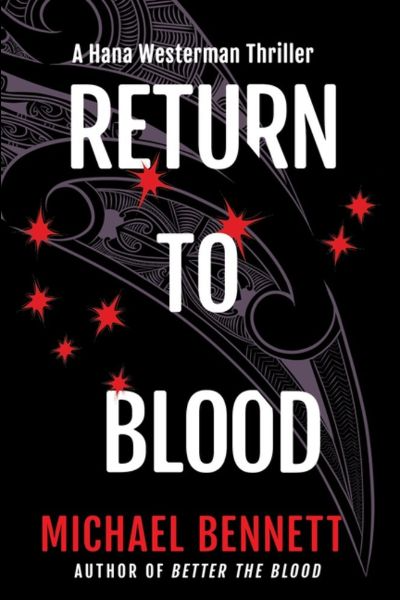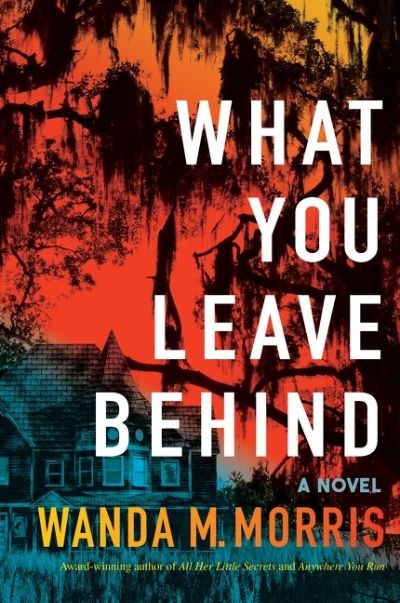Readers in search of a classic mystery need look no further, and if you have a fascination with San Francisco, as I do, then you’re doubly in luck. Capri Sanzio is the granddaughter of one of the City’s most famous serial killers: William “Overkill Bill” Sanzio, who’s now deceased. So named because “he bashed his three victims on the head, stabbed them to death, then sliced their throats after the fact.” A thorough kind of guy. Capri’s parents are shamed by their relationship to Bill, but Capri—who believes he was innocent—has a far more complicated response: she runs a highly successful business providing tours related to San Francisco’s serial killers (with herself, as Bill’s granddaughter, one of the prime attractions). But suddenly there’s a copycat of Bill murdering San Francisco women—one of whom is closely related to Capri—and the cops have made it clear that Capri or her daughter (herself a doctoral student in criminology) are their two prime suspects. With excursions from high society to the working class, and richly detailed portraits of San Francisco, this fascinating, fast-paced novel should find a broad readership. More, please?
Mystery & Detective
In a small Virginia town in 1968, a Black man named Jerome works for an elderly white couple. On Friday, when he expects to get his weekly salary, he walks into their house and finds their dead bodies. The police arrive and accuse him of resisting arrest and beat him. In jail with a head wound and bruises, the innocent man has already been convicted. A white lawyer named Jack Lee takes the case and immediately finds himself in the crosshairs of hate. Working with a female Black lawyer from Chicago, Jack struggles for justice in a town and environment where the verdict is already a foregone conclusion, and there is no lifeline for him or the case. Baldacci is one of the great storytellers, and he channels John Grisham in this compelling and harsh story that explores racism, the criminal justice system, and family dynamics. Half legal thriller and half an examination of the South at one of its most tumultuous times, this will be yet another bestseller for Baldacci and a novel destined for book club discussions.
Invincible is the adjective that comes most readily to mind when describing Maddy Montgomery, the hero in Valerie Burns’ Baker Street series. She’s relocated to the tiny, lake-front, Michigan town of New Bison, which is hundreds of miles from the closest Jimmy Choo boutique. Her nemesis in love has suddenly made an appearance, trashing Maddy all over social media. And while the bakery she inherited from her great-aunt is turning into a rip-roaring success, it attracts more dead bodies than the city morgue. Yes, there is a lot going on in this series, and we can’t forget the role of Baby, Maddy’s English Mastiff, who’s as expressive as any human. But one murder is rarely enough, and when a body washes ashore, it becomes clear that someone is out to suppress some important information. Once again Maddy needs to draw on the expertise of her great-aunt’s friends, the Baker Street Irregulars. This series has it all: fun, fashion, and friendship.
Following his acclaimed debut, Better the Blood, Michael Bennett’s compelling sophomore outing in his crime series starring Māori detective Hana Westerman proves the New Zealand screenwriter and author is no one-hit wonder as a mystery writer. In the wake of the traumatic events recounted in the first book, Hana has resigned from the Auckland CIB (Criminal Investigation Branch) and returned to her hometown of Tātā Bay, where she helps her father, Eru, prepare local Māori teens to get their driver’s licenses. But the calm Hana is trying to rebuild is shattered when her 18-year-old daughter, Addison, discovers the skeleton of a young woman in the sand dunes. Investigators suspect the bones may be those of Kiri Thomas, a Māori teenager who disappeared four years earlier. Although Hana is no longer in the police force, she begins to probe the possibility that Kiri’s death may be connected to the 21-year-old unsolved murder of Paige Meadows, whose body was found in the same dunes. Likewise, Addison becomes obsessed with Kiri’s fate, threatening her friendship with her non-binary flatmate and musical partner, Plus 1. In a nod to Alice Sebold’s The Lovely Bones, the storyline is interspersed with the dead Kiri’s haunting first-person narrative. Bennett, who is Māori, immerses readers deeper into Māori culture and traditions as he expands on Hana’s loving relationship with her father and tense interactions with her chilly second cousin, Eyes. An atmospheric thriller that will have readers booking flights to New Zealand. Bennett is adapting Better the Blood into a six-part TV series for Taika Waititi’s production company.
Perhaps only in New Orleans can there be a gay novice nun who is also a novice private detective and who offers up prayers like, “Hail Mary, share with me your divine vision, because I can’t see a fucking thing.” The nun in question is Sister Holiday, who teaches in a private school, runs a support group for survivors of Catholic Church sexual abuse, and on the side partners with a former cop to run Redemption Detective Agency. When the two hit the banks of the Mississippi to meet a new client, Holiday finds herself wading into the water to catch a body before it floats away. It’s her parish priest, and that awful discovery isn’t the last. Returning to school, the nun finds that another priest is missing. He seemed a kind young man, not one of the priests that Holiday loathes for their fake piety and fondness for their parishioners’ money. While a storm rages, Holiday must face the contradictions that are her life and life in New Orleans as well as help her brother and others face their demons, all while trying desperately to solve the mystery of the missing priest. Douaihy’s first in the series, Scorched Grace, was a New York Times Book Review Editors’ Choice, among other accolades. Fans of that book, as well as all who love an irreverent and smart lead, will happily join Sister Holiday for her second outing.
Jane Austen’s throngs of fans will adore this series starter that introduces the writer as a lively amateur sleuth; a treasured member of a large, loving family; and as a woman of her time—feisty but too often kept from her potential. The marriage market among Jane’s circle looms large, of course, with Jane hoping for a proposal any day from a young Irishman while those around her assess one another in terms of their potential as financial insurance. When an alliance is about to be announced by a local family, their façade of gentility is threatened when a young woman is found murdered in their home. Jane recognizes her as a milliner she’s bought from lately. The local magistrate seems content to blame “gypsies” for the crime, an accusation Jane disputes as no traveling people have been seen in the area lately, but she’s soon sorry when another is accused: her mentally disabled brother, George. It’s now up to our literary hero to find the real killer and bring George home. The large cast of characters here keeps things lively; there’s often humor too, both in Jane’s wry comments throughout and in her witty letters to her sister about the case’s progression.
A classic mystery that pulls the reader in and doesn’t let go until there’s a resolution. It’s the mid-1960s, and Franklin Warren arrives in small-town Bethany, Vermont to join the state troopers as a detective. It’s a time of change: as young men head to Canada to escape the draft, the state is developing highways that, many fear, will change Vermont irrevocably, while the echoes of the Cold War continue to reverberate. Warren is also escaping his own demons, a tragic occurrence he left behind in Boston but is unable to forget. But before he can unpack—literally!—he’s called to investigate a fire; Hugh Weber, a hippie farmer, has burnt down his barn and likely killed himself, although evidence of suicide is scant. Warren digs deep into the community, from Weber’s widow to Warren’s elderly next-door-neighbor, a retired intelligence agent. Secrets abound, but which one will unveil the murderer? Fans of Kay Jennings and Jeff Carson will appreciate this new series by the author of The Drowning Sea.
A beautifully balanced novel that includes a foray into the world of the Gullah-Geechee people, the experience of grief, and the uncovering of a land grab, all wrapped up in an edge-of-the-seat thriller. Deena Wood is back in her hometown in coastal South Carolina. A 40-something lawyer, she had been living in Atlanta until her husband divorced her, she lost a court case—and her job—and her beloved mother died. It’s time to start over, which means moving in with Dad and his new wife. To unwind, Deena likes to drive along the coast, and one day she comes across a cantankerous, elderly African American man who states that he is fighting to keep his valuable land. Suspicious of Deena’s motives—has she been sent to make him move?—he chases her off his property. But Deena can’t forget him, and when she returns a week later, she discovers he’s gone, with no trace left behind. Deena becomes obsessed, and sets out on a fascinating but deadly search that takes her deep within her community as she goes after a conspiracy that has been exploiting the rural poor for decades, right up to today. Morris (All Her Little Secrets) has written a perfect novel for a book group, and it’s sure to be one of the best books of 2024.
On New Year’s Day 1985, as the countdown to Ronald Reagan’s second presidential inauguration begins, Turnip Coogan, in custody for the murder of real estate developer Randall Hubbard, falls from the roof of the courthouse in downtown Meridian, Mississippi. It may be morning in the rest of America, but that Reaganite optimism has bypassed the state’s “Queen City,” where strip malls developed by the late Hubbard have “sucked the life out of the city’s downtown” and its convenient location between New Orleans and Atlanta has made Meridian “a vital pit stop in the loosely affiliated crime belt of the Deep South.” Knowing of her son’s connection to the notorious Dixie Mafia, Lenora Coogan is convinced that his death was neither an accident nor a suicide and hires Black cop-turned-private investigator Clementine Baldwin and her white partner, Dixon Hicks, to find the “sons of bitches who killed him.” Complicating the investigation is the still-jailed Odette Hubbard, who had recruited Turnip to kill her husband and then canceled the hit job. She wants Clem and Dixon to identify the real killer, a request that puts a target on Clem’s back. Jim Crow laws may be a thing of the past, but Clem still must battle old-fashioned racism as she goes after the city’s powerbrokers. Wright’s (American Pop) Southern noir introduces a compelling, complex, bourbon-loving sleuth who both loathes and loves her hometown. Her budding friendship with Dixon will have readers anticipating their next crime-solving adventure.
As always, Blacke (Vinyl Resting Place, 2022) does a fabulous job of keeping several balls in the air, from romances to murder, from seeking likely perpetrators to fighting off a pair of predatory investors. Small-town Cedar River, where gossip spreads like warm butter, provides the setting, while the three Jessup sisters—the youngest, Juni, is our narrator—are still struggling to keep their cafe/vinyl record store alive. When a crazy storm rips through town—this is Texas, after all—it washes out the roads, knocks out the electricity, and leaves a corpse in a parked car near their shop. He turns out to be one of the predatory investors—Juni knew him from college—who was hoping to make a deal with the sisters. But more importantly, with the town now isolated, where is the murderer hiding? The characters are wonderful, with Juni’s voice and sense of humor especially fresh, and the storyline is completely absorbing. A real treat for cozy fans.










